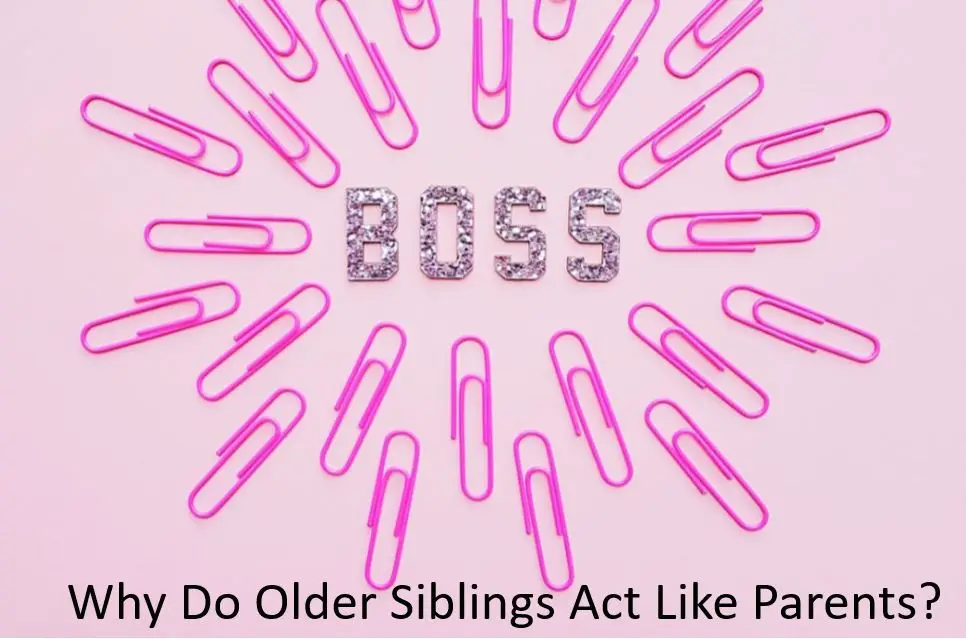Why Do Older Siblings Act Like Parents?

So, I’m guessing you want to know why your oldest child boss around their younger siblings?
In some ways, it’s quite enjoyable to watch your eldest practice leadership and learn to persuade something to their siblings.
And there is absolutely nothing wrong with that if we are talking about gentle guidance rather than command and disciplining the youngsters.
It should be clear to everyone in the family that YOU (the parent) have the power and control over the family.
So, let’s examine why older siblings act like parents and whether that’s ok.
Are you ready?
Let’s get on with it, shall we?
Why Do Older Siblings Act Like Parents?
Older siblings act like parents because of the following reasons: 1) Because parents requested them to help with taking care of their younger siblings with simple, age-appropriate activities; 2) Because parents forced the oldest child to look after their younger kids due to their own inability to care for them 3) Because some children are born more power-driven and desire control over people and situations 4) Because the oldest kids tend to copy our behaviour, hence appear to act like you.
1. Parents Expect The Oldest Child To Help With Younger Siblings
Ok, so let’s be honest here.
Have you ever asked your oldest child to do the following things?
- Watch the younger ones while you do some house chores.
- Look out for the younger ones and protect them when on the playground.
- Fix them a bowl of cereals in the busy morning.
- Hold their hands when out and about.
- Help the younger ones tidy up their toys.
- Help them dress up.
- Help them brush their teeth.
- Help them with shoelaces.
- And later help them with their homework.
I think you get my point, don’t you?
I must admit that I’m guilty of asking my firstborn daughter to help me with parenting duties sometimes…
And I know I am not alone here.
Because it’s our subconscious expectation that older children will take on some of our responsibilities against our younger kids. That’s because the subsequent kids won’t receive as much attention from us as the firstborn did. And we must split our time between each child. We also put pressure on your oldest one behaviour to set an example for the younger siblings.
So it is we who made the oldest child behave as parents to our younger children!
Arguably, it is normal for a parent to ask older children to help with some tedious activities with their youngsters.
BUT
It is only acceptable with age-appropriate activities they feel comfortable doing (see my list above).
In fact, these minor tasks can also be rewarding and encouraging for your oldest child too!
That’s because they build their confidence by taking on a leadership role. Which enables them to develop dependability and responsibility skills.
So, in a way, you kill two birds with one stone. How cool is that!?
What you must remember is that you shouldn’t hold your oldest child responsible for their siblings.
Kids are simply incapable of taking adequate care of younger children, especially when safety risks are involved.
Your children YOUR RESPONSIBILITY, and your responsibility only – not your older kids!
After all, kids are still just kids, so they should enjoy childhood while it lasts.
Related post =======> How Does Older Sibling Influence Development Of Younger Sibling?
2. Parentification: Childhood Deprivation vs Early Competencies
Now, the things listed above don’t seem like a big deal to ask of your older child. And, as we said – these tasks can positively shape their personality.
However, it’s a very different story if parents rely on their eldest to perform chores that aren’t meant for kids and are beyond their capability.
There is even a name for this: Parentification.
Parentification is a process when a child is pushed into taking a role of a caretaker of the younger siblings and providing them with mental and practical support.
Why Do Parents Stop Acting As Parents?
Now, the most common reason for parents to delegate their duties to the oldest offspring is because of parental compromise in some form or shape. For example:
- Parents are severely troubled and simply aren’t able to care for children. This can occur due to illness, disability, depression, or another mental disorder.
- Child neglect due to alcohol or drug abuse.
- Parental divorce.
- Death of one parent.
- Parental workaholism, which means prioritizing work over childcare.
- Economical hardship.
- Parents experienced abuse in childhood.
Because of these parental dysfunctions, they usually force the oldest child to assume parental duties and become emotional and practical support for younger siblings.
And we talk here about full-blown caregiving.
Which includes cooking, cleaning, washing, grocery shopping, and paying bills. Not just guiding them through the house rules and holding their hands when crossing the road!
Effects of Parentification On The Parentified Children
Most times, parentification has a negative impact on the mental and physical health of the childhood-deprived kid and has long-lasting effects experienced in adulthood.
Parentified children often suffer from anxiety, depression, and obsessive-compulsive disorder. Furthermore, they experience difficulties in social life and have trouble forming healthy relationships.
In the absence of early intervention, this problem will continue to cause dysfunction for the duration of their lives. Such as fear of having children or repeating the pattern of parentifying their own children.
Having said that, contrary evidence suggests that parentification doesn’t always result in dramatic consequences for the affected individual.
Many of these kids develop incredible caregiving skills and high reliability. They often take careers as nurses, childcare, or social workers. Those who were relied upon for emotional support develop empathy and high levels of interpersonal skills.
That is not to say that parentifying is acceptable, and I would do that to my kids, though!
3. Child’s Personality
Yep, as simple as that.
Because some children are naturally bossier and power-driven and strongly need to organize and control the situation, activities, or behaviour of other children.
They tend to be more arrogant towards their younger siblings, constantly telling them what to do, even if they really don’t mean to!
Now, this dynamic can be ok if the youngsters are more passive or accept this course of action.
It is often necessary for parents to intervene in such behaviour. It is crucial for parents to help their children find a balance between confidence and arrogance, leadership and ordering around.
Otherwise, this behaviour may hurt relationships between siblings in the future.
Preventing Bossy Behaviour
4. They Copy Your Behaviour
Ever heard the quote by Robert Fulghum: “Don’t worry that your children never listen to you; worry that they are always watching you”?
That’s so true, isn’t it?
And it is yet another reason your eldest one act like a parent – because she is copying exactly what you do.
Think about it. Does your bossy child sound exactly like you when she exercises authority on the youngest ones, eh?
Imitation is the most instinctive behaviour of all human beings. That’s how they learn about the world. By constant studies and analysis of our behaviour, copying gestures, words, expressions and even our roles!
Final Few Lines
It is pretty normal in families with at least 2 kids for the oldest one to act like a parent to their siblings. Especially if there is a sizeable gap in age between them.
The reasons for such behaviour are:
- Parents have asked the oldest siblings to guide the younger ones through the house rules and help them with some simple and age-appropriate tasks. Hence, the older kids appear to act like a parent to the younger ones.
- Parents forced their older children to look after their younger siblings because of their dysfunction.
- Some kids have power-craving personalities that dominate over the younger siblings and boss them around.
- And finally, older siblings may appear bossy because they simply copy what their (bossy) parents do.
The bottom line is that there is nothing wrong with older children contributing to younger siblings’ upbringing. That is actually beneficial to the whole family.
However, parents should set realistic expectations for their firstborns and remember that they are still just kids.
